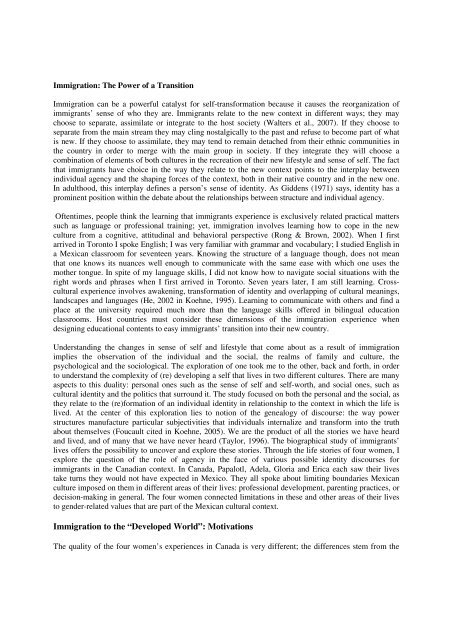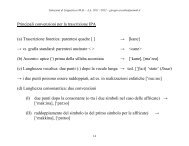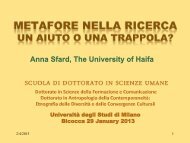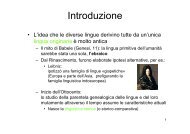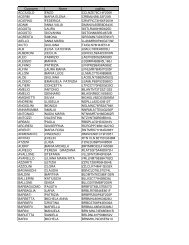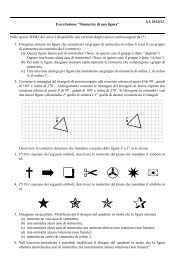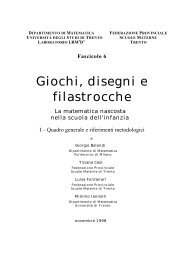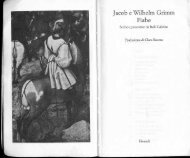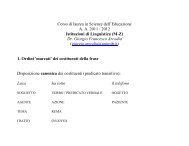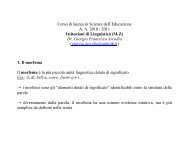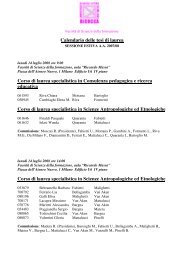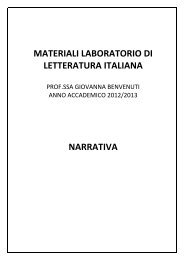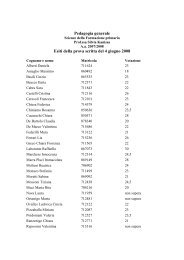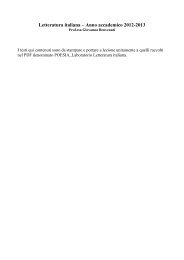Life history research: A contribution to processes of adult learning ...
Life history research: A contribution to processes of adult learning ...
Life history research: A contribution to processes of adult learning ...
Create successful ePaper yourself
Turn your PDF publications into a flip-book with our unique Google optimized e-Paper software.
Immigration: The Power <strong>of</strong> a Transition<br />
Immigration can be a powerful catalyst for self-transformation because it causes the reorganization <strong>of</strong><br />
immigrants’ sense <strong>of</strong> who they are. Immigrants relate <strong>to</strong> the new context in different ways; they may<br />
choose <strong>to</strong> separate, assimilate or integrate <strong>to</strong> the host society (Walters et al., 2007). If they choose <strong>to</strong><br />
separate from the main stream they may cling nostalgically <strong>to</strong> the past and refuse <strong>to</strong> become part <strong>of</strong> what<br />
is new. If they choose <strong>to</strong> assimilate, they may tend <strong>to</strong> remain detached from their ethnic communities in<br />
the country in order <strong>to</strong> merge with the main group in society. If they integrate they will choose a<br />
combination <strong>of</strong> elements <strong>of</strong> both cultures in the recreation <strong>of</strong> their new lifestyle and sense <strong>of</strong> self. The fact<br />
that immigrants have choice in the way they relate <strong>to</strong> the new context points <strong>to</strong> the interplay between<br />
individual agency and the shaping forces <strong>of</strong> the context, both in their native country and in the new one.<br />
In <strong>adult</strong>hood, this interplay defines a person’s sense <strong>of</strong> identity. As Giddens (1971) says, identity has a<br />
prominent position within the debate about the relationships between structure and individual agency.<br />
Oftentimes, people think the <strong>learning</strong> that immigrants experience is exclusively related practical matters<br />
such as language or pr<strong>of</strong>essional training; yet, immigration involves <strong>learning</strong> how <strong>to</strong> cope in the new<br />
culture from a cognitive, attitudinal and behavioral perspective (Rong & Brown, 2002). When I first<br />
arrived in Toron<strong>to</strong> I spoke English; I was very familiar with grammar and vocabulary; I studied English in<br />
a Mexican classroom for seventeen years. Knowing the structure <strong>of</strong> a language though, does not mean<br />
that one knows its nuances well enough <strong>to</strong> communicate with the same ease with which one uses the<br />
mother <strong>to</strong>ngue. In spite <strong>of</strong> my language skills, I did not know how <strong>to</strong> navigate social situations with the<br />
right words and phrases when I first arrived in Toron<strong>to</strong>. Seven years later, I am still <strong>learning</strong>. Crosscultural<br />
experience involves awakening, transformation <strong>of</strong> identity and overlapping <strong>of</strong> cultural meanings,<br />
landscapes and languages (He, 2002 in Koehne, 1995). Learning <strong>to</strong> communicate with others and find a<br />
place at the university required much more than the language skills <strong>of</strong>fered in bilingual education<br />
classrooms. Host countries must consider these dimensions <strong>of</strong> the immigration experience when<br />
designing educational contents <strong>to</strong> easy immigrants’ transition in<strong>to</strong> their new country.<br />
Understanding the changes in sense <strong>of</strong> self and lifestyle that come about as a result <strong>of</strong> immigration<br />
implies the observation <strong>of</strong> the individual and the social, the realms <strong>of</strong> family and culture, the<br />
psychological and the sociological. The exploration <strong>of</strong> one <strong>to</strong>ok me <strong>to</strong> the other, back and forth, in order<br />
<strong>to</strong> understand the complexity <strong>of</strong> (re) developing a self that lives in two different cultures. There are many<br />
aspects <strong>to</strong> this duality: personal ones such as the sense <strong>of</strong> self and self-worth, and social ones, such as<br />
cultural identity and the politics that surround it. The study focused on both the personal and the social, as<br />
they relate <strong>to</strong> the (re)formation <strong>of</strong> an individual identity in relationship <strong>to</strong> the context in which the life is<br />
lived. At the center <strong>of</strong> this exploration lies <strong>to</strong> notion <strong>of</strong> the genealogy <strong>of</strong> discourse: the way power<br />
structures manufacture particular subjectivities that individuals internalize and transform in<strong>to</strong> the truth<br />
about themselves (Foucault cited in Koehne, 2005). We are the product <strong>of</strong> all the s<strong>to</strong>ries we have heard<br />
and lived, and <strong>of</strong> many that we have never heard (Taylor, 1996). The biographical study <strong>of</strong> immigrants’<br />
lives <strong>of</strong>fers the possibility <strong>to</strong> uncover and explore these s<strong>to</strong>ries. Through the life s<strong>to</strong>ries <strong>of</strong> four women, I<br />
explore the question <strong>of</strong> the role <strong>of</strong> agency in the face <strong>of</strong> various possible identity discourses for<br />
immigrants in the Canadian context. In Canada, Papalotl, Adela, Gloria and Erica each saw their lives<br />
take turns they would not have expected in Mexico. They all spoke about limiting boundaries Mexican<br />
culture imposed on them in different areas <strong>of</strong> their lives: pr<strong>of</strong>essional development, parenting practices, or<br />
decision-making in general. The four women connected limitations in these and other areas <strong>of</strong> their lives<br />
<strong>to</strong> gender-related values that are part <strong>of</strong> the Mexican cultural context.<br />
Immigration <strong>to</strong> the “Developed World”: Motivations<br />
The quality <strong>of</strong> the four women’s experiences in Canada is very different; the differences stem from the


